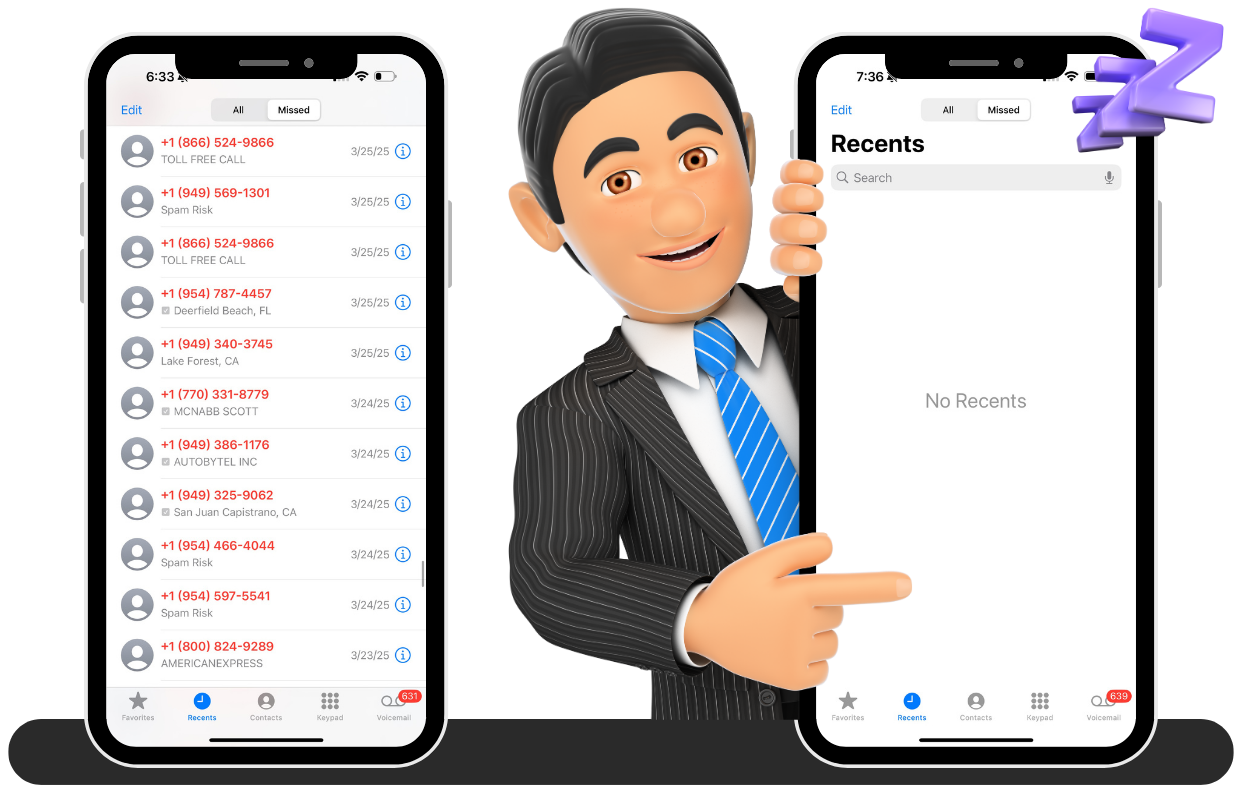You filed a complaint with donotcall.gov. Now what?
Let me guess how this went:
1. You got another annoying robocall
2. You went to donotcall.gov/report
3. You filled out the form
4. You got a confirmation message
5. You felt... nothing changed
Because nothing DID change.
The calls kept coming. The scammers kept scamming. And your complaint went into a database that nobody reads.
It's time to learn what the FTC doesn't tell you: Filing complaints isn't enough. But it IS step one...
What Actually Happens When You File a DNC Complaint?
Here's the uncomfortable truth:
Your Complaint Goes Into a Database
The FTC collects complaints. As of 2025, they receive over 7 MILLION robocall complaints per year.
That's 19,178 complaints PER DAY.
Your complaint becomes... number 4,891,243.
The FTC Analyzes "Trends"
They're not investigating YOUR specific call. They're looking for patterns:
- • What types of scams are increasing?
- • Which companies show up repeatedly?
- • What numbers are being reported most?
Maybe, Eventually, They Take Action
If a company gets THOUSANDS of complaints over YEARS, the FTC might:
- • Send a warning letter
- • Start an investigation (2-3 years later)
- • File a lawsuit (if you're lucky)
- • Levy a fine (that the company ignores or goes bankrupt to avoid)
You Get... Nothing
No compensation. No follow-up. No resolution. Just the satisfaction of "doing something."
Which, let's be honest, isn't that satisfying when your phone is STILL ringing.
Why Filing DNC Complaints Isn't Enough (But You Should Still Do It)
Why It's Not Enough:
- • The FTC is understaffed (300 people for 7 million complaints)
- • Government action is slow (years, not months)
- • Scammers know this and don't care
- • You get zero compensation
- • The calls don't stop
Why You Should STILL File:
- • Creates an official record
- • Strengthens your personal TCPA case
- • Proves you took reasonable steps
- • Shows pattern of harassment
- • Helps future legal action
Think of FTC complaints as building your legal foundation. Not the solution itself.
The Next Step: Private Legal Action
Here's what actually WORKS:
Step 1: File Your FTC Complaint (Do This First)
Go to donotcall.gov/report and file. It takes 3 minutes and creates a timestamp.
Step 2: Document the Violation for YOUR Case
While the FTC does... whatever they do... YOU build your case:
- • Date and time of call
- • Phone number (even if spoofed)
- • What they said
- • Whether you asked them to stop
- • Your DNC registration date
- • Screenshot of FTC complaint confirmation
Step 3: Take Personal Legal Action
Don't wait for the government. Under the TCPA, YOU can sue directly:
- • $500-$1,500 per illegal call
- • Cases often settle in 4-6 months
- • YOU get the money, not the government
- • Calls actually STOP (you become expensive to call)
Real Example: FTC Complaint vs Personal Action
What Maria Did (The Old Way):
Maria got car warranty robocalls. 35 calls over 3 months. She filed FTC complaints after each one.
Result after 6 months:
- • FTC actions: 0
- • Calls stopped: No
- • Money received: $0
- • Satisfaction: Low
What Tom Did (The Smart Way):
Tom got the SAME car warranty robocalls. 42 calls over 3 months. He:
- • Filed FTC complaints (establishing record)
- • Also documented with DNCme
- • Filed TCPA lawsuit after 90 days
- • Company settled quickly
Result after 6 months:
- • Settlement received: $31,500
- • After legal fees: $21,525
- • Calls stopped: YES (immediately after settlement)
- • Satisfaction: Very high
Same scam. Same number of calls. VERY different outcomes.
Do Not Call Violations Explained (What Makes Your Case Strong)
Violation Type #1: Calling After DNC Registration
If you're on the National Do Not Call Registry for 31+ days, marketing calls are illegal.
Strength: Very High - Easy to prove, hard to defend against
Violation Type #2: No Established Business Relationship
They can't call you just because. You need to have done business with them or requested contact.
Strength: High - Most robocallers can't prove relationship
Violation Type #3: Continuing After "Stop" Request
Once you ask them to stop, they must stop. Period.
Strength: Very High - Clear cut violation, often worth $1,500 instead of $500
Violation Type #4: Using Automated Dialer Without Consent
Robocalls and auto-dialers need written consent to call cell phones.
Strength: High - Pre-recorded messages make this obvious
Violation Type #5: Calling Outside Legal Hours
Before 8 AM or after 9 PM (your local time) is illegal.
Strength: Extreme - Courts REALLY don't like this
How to Turn Complaints Into Compensation
The System That Works:
Week 1-2: Setup
- • Verify you're on DNC Registry (donotcall.gov/verify)
- • Join DNCme for automated documentation
- • Start tracking ALL spam calls
Weeks 3-12: Evidence Collection
- • Let calls come through (don't block yet)
- • File FTC complaint after each call
- • DNCme logs details automatically
- • Build your violation count
Week 13: Legal Action
- • Review case with TCPA lawyer (free consultation)
- • File demand letter or lawsuit
- • Let lawyer handle negotiations
Weeks 14-24: Settlement
- • Company reviews evidence
- • Settlement offer comes in
- • Negotiate (don't take first offer)
- • Settle and collect money
Week 25+: Freedom
- • Calls mysteriously stop
- • Enjoy your settlement money
- • Your number is now flagged as "litigious"
Real Payouts for Real Robocall Victims
Health Insurance Scams: Average $28,000 settlements
Auto Warranty Calls: Average $23,000 settlements
Debt Collection Harassment: Average $35,000 settlements (higher because they call more)
Solar Panel Spam: Average $19,000 settlements
Student Loan Scams: Average $21,000 settlements
What DNCme Does That The FTC Doesn't:
The FTC:
- • Collects your complaint
- • Does nothing with it for years
- • Maybe eventually investigates
- • You get $0
DNCme:
- • Documents violations automatically
- • Identifies real companies (even behind spoofed numbers)
- • Connects you with TCPA specialist lawyers
- • Helps you file and win your case
- • You get $15,000-$30,000 on average
- • Timeline: 4-7 months, not years
The Next Step After Filing a Complaint:
You did the right thing filing with the FTC. Seriously. It creates a record.
But if you stop there, nothing changes.
The scammers keep calling. The money keeps flowing (to them). And you're still frustrated.
The next step is personal legal action.
Stop waiting for the government to save you. Use the law to save yourself AND get compensated.
DNCme connects you to legal help fast. Here's how to collect for your time and privacy.
Go Beyond Complaints
Do Not Call violations explained. Turn complaints into compensation. Real payouts for real robocall victims.
Stop Robocalls NowP.S. The average person who files FTC complaints but takes no other action: $0 recovered, calls continue. The average DNCme member who files complaints AND takes legal action: $23,400 recovered, calls stop. Which would you prefer?
P.P.S. DNCme connects you to legal help fast. The next step after filing a complaint is getting PAID. Go beyond reporting — get compensated.

